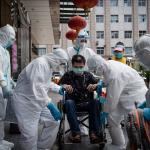You May Have Antibodies After Coronavirus Infection. But Not for Long.

It’s a question that has haunted scientists since the pandemic began: Does everyone infected with the virus produce antibodies — and if so, how long do they last?
Not very long, suggests a new study published Thursday in Nature Medicine. Antibodies — protective proteins made in response to an infection — may last only two to three months, especially in people who never showed symptoms while they were infected.
The conclusion does not necessarily mean that these people can be infected a second time, several experts cautioned. Even low levels of powerful neutralizing antibodies may still be protective, as are the immune system’s T cells and B cells.
But the results offer a strong note of caution against the idea of “immunity certificates” for people who have recovered from the illness, the authors suggested.
Antibodies to other coronaviruses, including those that cause SARS and MERS, are thought to last about a year. Scientists had hoped that antibodies to the new virus might last at least as long.
Several studies have now shown that most people who are visibly ill with Covid-19 develop antibodies to the virus, although it has been unclear how long those antibodies last. The new study is the first to characterize the immune response in asymptomatic people.
The researchers compared 37 asymptomatic people to an equal number who had symptoms in the Wanzhou District of China. The investigators found that asymptomatic people mount a weaker response to the virus than those who develop symptoms.
Antibodies fell to levels below the threshold for a seropositive diagnosis in 40 percent of asymptomatic people, compared with just 13 percent of symptomatic people.
The sample size is small, however, and the researchers did not take into account protection offered by immune cells that may fight the virus on their own or make new antibodies when the virus invades. A few studies have shown that the coronavirus stimulates a robust and protective cellular immune response.
“Most people are generally not aware of T cell immunity, and so much of the conversation has focused on antibody levels,” said Angela Rasmussen, a virologist at Columbia University.
Apart from T cells, which can kill the virus on encounter, people who have been infected make so-called memory B cells, which can rapidly ramp up antibody production when needed.
“If they find the virus again, they remember and start to make antibodies very, very quickly,” said Florian Krammer, a virologist at the Icahn School of Medicine at Mount Sinai, who has led several studies of antibodies to the coronavirus.
In the new study, antibodies to one viral protein dropped below detectable levels. But a second set of antibodies targeting the so-called spike protein of the coronavirus — needed to neutralize the virus and prevent reinfection — were still present.
In fact, these antibodies seemed to show a smaller decline in asymptomatic people than in symptomatic people. “The neutralizing antibody is what matters, and that tells a very different story,” Dr. Krammer said.
A second paper, published on Thursday in the journal Nature, suggests that even low levels of antibodies might be enough to thwart the virus. “It does appear that even low levels of certain antibodies have potent neutralizing capability,” said Dr. Rasmussen, the Columbia University virologist. “Low antibody titers don’t necessarily determine whether a patient will be protected from reinfection.”
Between 20 and 50 percent of those infected may never show outward signs of the illness. The new study from China, which tracked people over time to confirm that they never developed symptoms, put that number at 20 percent.
About a third of the asymptomatic people had the “ground-glass opacities” characteristic of Covid-19 and abnormalities in the lungs and in cell types, however.
The study also found that asymptomatic people shed virus when infected, and did so for longer than those who had symptoms. That finding is interesting because “it actually might suggest that these asymptomatic patients are indeed capable of transmitting virus,” Dr. Rasmussen said.
But she and other experts noted that it’s unclear whether the virus shed by asymptomatic people is capable of infecting others. “It is important to know if they are shedding infectious virus, or just remnants of the virus,” said Akiko Iwasaki, a viral immunologist at Yale University.
Dr. Iwasaki was more concerned than the other experts about the two new studies.
“These reports highlight the need to develop strong vaccines, because immunity that develops naturally during infection is suboptimal and short-lived in most people,” she said. “We cannot rely on natural infection to achieve herd immunity.”
Apoorva Mandavilli is a reporter for The Times, focusing on science and global health. She is the 2019 winner of the Victor Cohn Prize for Excellence in Medical Science Reporting.
She is the founding editor in chief of Spectrum, an award-winning news site on autism science that grew an audience of millions. She led the team there for 13 years. She joined The Times in May 2020, after two years as a regular contributor.
Apoorva has won numerous awards for her writing. Her work has been published in The Atlantic, Slate and The New Yorker online, and in the anthology ”Best American Science and Nature Writing.”
She co-founded Culture Dish, an organization dedicated to enhancing diversity in science journalism, and was the founding chair of the Diversity Committee for the National Association of Science Writers. Apoorva has a Master of Arts degree in journalism from New York University and a Master of Science degree in biochemistry from the University of Wisconsin-Madison. She is fluent in English, Hindi, Tamil, Telugu and Kannada.
